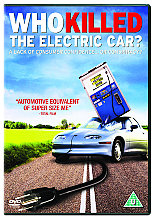Free Membership
Welcome to DVD-Movie-Sale.co.uk!
DVD Movie Sale is a comprehensive DVD site where you can search for any movie by genre, film title, actors name or director. Complete with full film information & synopsis as well as being able to compare prices for your favourite DVD from leading retail stores. You even have the opportunity to include your personal film reviews or give your personal ratings with numerous chances to win dvd related prizes.
Browse DVDs
Who Killed The Electric Car?
Who Killed The Electric Car?

Director: Chris Paine
Summary: In the 1990s, following California's passing of the Zero Emission Vehicle mandate, American car companies began producing electric cars for mainstream consumption. GM's EV1, which was by all accounts quiet, fast, and capable of driving up to 80 miles on one charge, used no gasoline and quickly developed an intensely devoted following in California. But even as its popularity grew, car manufacturers were fighting the mandate; it was overturned, and by 2005 just about every single EV1 had been recalled, crushed, and shredded. GM put its resources into the Hummer instead. WHO KILLED THE ELECTRIC CAR? looks at the tangled web of interests behind the car's untimely demise.
In the 1990s, following California's passing of the Zero Emission Vehicle mandate, American car companies began producing electric cars for mainstream consumption. GM's EV1, which was by all accounts quiet, fast, and capable of driving up to 80 miles on one charge, used no gasoline and quickly developed an intensely devoted following in California. But even as its popularity grew, car manufacturers were fighting the mandate; it was overturned, and by 2005 just about every single EV1 had been recalled, crushed, and shredded. GM put its resources into the Hummer instead. WHO KILLED THE ELECTRIC CAR? looks at the tangled web of interests behind the car's untimely demise, laying out convincing cases against the auto industry, big oil, corrupt federal and state governments, and consumers themselves. Chris Paine's directorial debut is not especially stylish, but it is effective. He leads viewers through the twisty maze of politics and profit that surrounds the main story, taking time to dwell on the passionate attachment that many of the cars' drivers still feel for them. Appropriately, the film is narrated by Martin Sheen--the embodiment for many Americans of socially conscious leadership, thanks to his many years on THE WEST WING--and features interviews with a motley array of celebrities from Mel Gibson to Ed Begley, Jr., but the real star of the movie is the doomed car itself and all that it stands for. The film is not especially fair or balanced; very little screen time is devoted to criticism of electric cars, and the only person on camera defending the oil companies is a singularly slimy and unappealing spokesperson from whom most viewers would be unwilling to buy a used car of any variety. But it certainly succeeds as a rousing, if occasionally depressing, call to awareness and action.

WIN DVDS by being amongst the first to review this DVD. Reviewing DVDs earns you bonus entries and lets you WIN DVDs!Please login before reviewing this DVD. If you're a new user, register for free and enter to WIN FREE DVDs!

| Aspect Ratio: | 1.78 Wide Screen |
| Main Language: | English |
| Region: | Region 2 |
| Special Features: | Jump Starting the Future - Documentary , Meeky Rosie Music Video - 'Forever' , Deleted scenes , |
| Subtitles: | Hindi |
| Year: | 2006 |
| Release Date: | March 19, 2007 |
| Runtime: | 89 minutes |
| Certification: | |
| Catalogue Number: | C D R 44970 |
| Keywords: | Car, English, Who, Electric, General, Killed, Documentaries, Biographies |
| Genre: | Documentaries & Biographies |






















